lesson18
- 格式:doc
- 大小:28.50 KB
- 文档页数:4
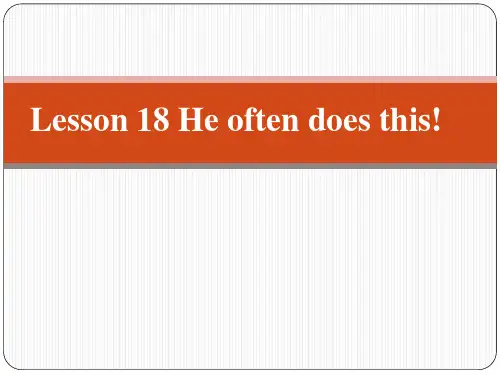
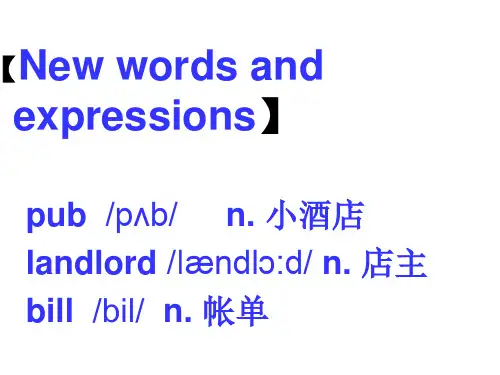
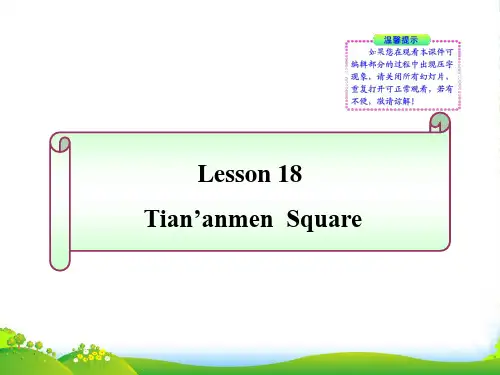
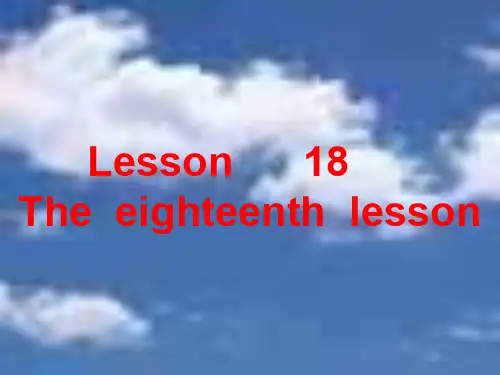
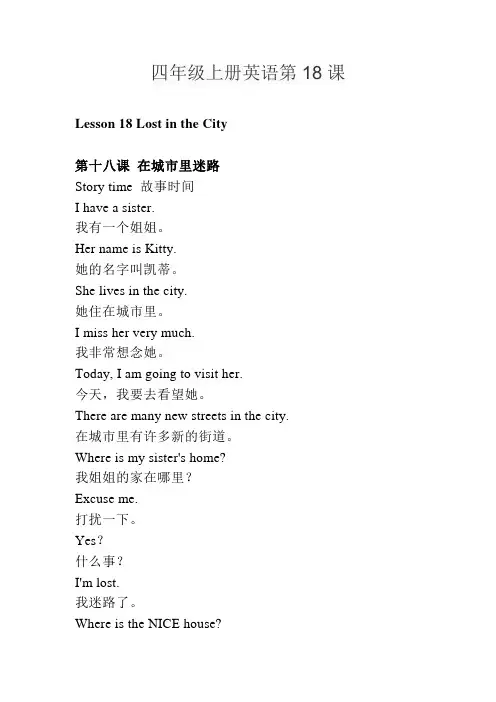
四年级上册英语第18课Lesson 18 Lost in the City第十八课在城市里迷路Story time 故事时间I have a sister.我有一个姐姐。
Her name is Kitty.她的名字叫凯蒂。
She lives in the city.她住在城市里。
I miss her very much.我非常想念她。
Today, I am going to visit her.今天,我要去看望她。
There are many new streets in the city.在城市里有许多新的街道。
Where is my sister's home?我姐姐的家在哪里?Excuse me.打扰一下。
Yes?什么事?I'm lost.我迷路了。
Where is the NICE house?名叫NICE的房子在哪里?I meet a nice dog.我遇见了一只友善的狗。
The dog says, "Look! Go straight and turn left." 这只狗说,“看!直着走,向左转。
”But when I get there,但是当我到那里的时候,I see the Mice house,我看见的是名叫MICE的房子,not the NICE house.而不是叫NICE的房子。
Oh no!哦不!Excuse me, where is the NICE house?打扰一下,请问叫NICE的房子在哪里?I'll show you.我指给你。
Thank you.谢谢。
I meet an old bird.我遇见了一只年迈的鸟。
The old bird says,这只年迈的鸟说,"Go straight and turn right at the traffic lights. “直着走,在信号灯那里向右转。
Then you will see the Nice house on the left." 然后你就会在左边看见叫NICE的房子。
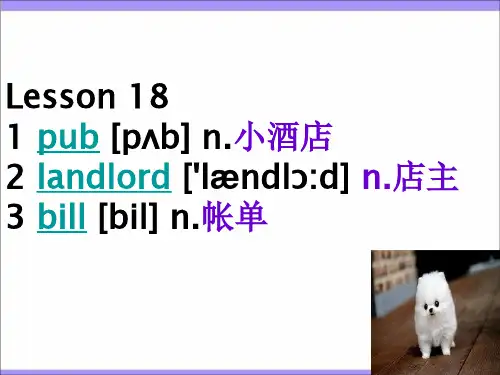
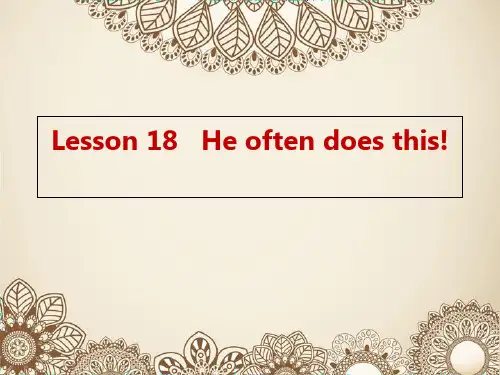
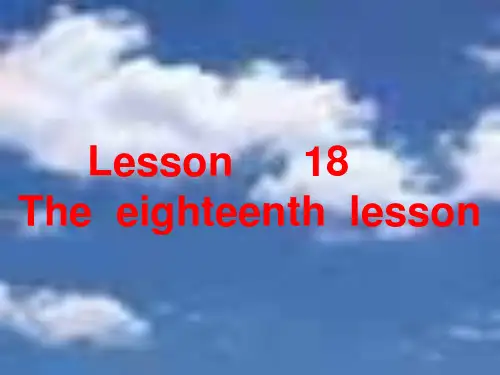
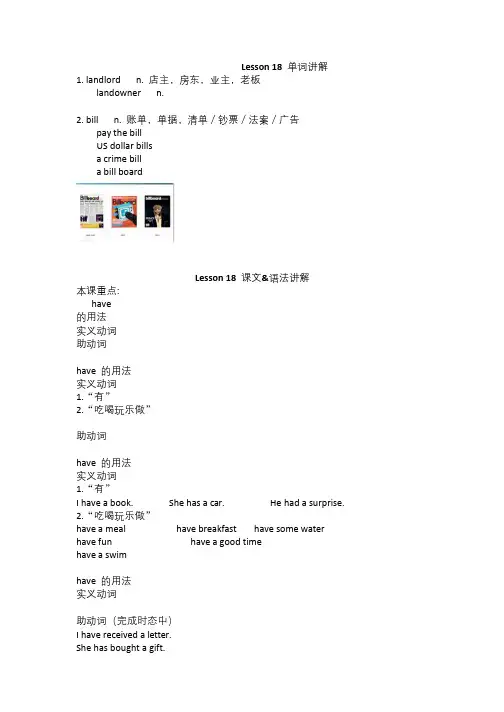
Lesson18单词讲解ndlord n.店主,房东,业主,老板landowner n.2.bill n.账单,单据,清单/钞票/法案/广告pay the billUS dollar billsa crime billa bill boardLesson18课文&语法讲解本课重点:have的用法实义动词助动词have的用法实义动词1.“有”2.“吃喝玩乐做”助动词have的用法实义动词1.“有”I have a book.She has a car.He had a surprise.2.“吃喝玩乐做”have a meal have breakfast have some water have fun have a good timehave a swimhave的用法实义动词助动词(完成时态中)I have received a letter.She has bought a gift.He had left.have的用法(用法不同,变否定疑问也不同)实义动词助动词(完成时态中)I have received a letter.I have not received a letter.She has bought a gift.She has not bought a gift.He had left.He had not left.have的用法(用法不同,变否定疑问也不同)实义动词I have a book.I do not have a book. She has lunch.She does not have lunch. He had a good time.He did not have a good time.助动词(完成时态中)have的用法(用法不同,变否定疑问也不同)实义动词I have a book.I do not have a book. She has lunch.She does not have lunch. He had a good time.He did not have a good time.助动词(完成时态中)I have received a letter.I have not received a letter.She has bought a gift.She has not bought a gift.He had left.He had not left.have的用法练习:(判断用法,并变否定疑问)1.You have a lot of money.2.They had a swim yesterday.3.She has eaten breakfast.4.My dog had taken it into the garden.have的用法练习:(判断用法,并变否定疑问)1.You have a lot of money.2.They had a swim yesterday.3.She has eaten breakfast.4.My dog had taken it into the garden.have的用法练习:(判断用法,并变否定疑问)1.You have a lot of money.You do not have a lot of money.2.They had a swim yesterday.They did not have a swim yesterday.3.She has eaten breakfast.She has not eaten breakfast.4.My dog had taken it into the garden.My dog had not taken it into the garden.have的用法补充两点:“有”have=have got实义动词助动词You have a lot of money.=You have got a lot of money.do not have have not got have的用法补充两点:1.“有”have=have got2.have/has had had hadI had had lunch at a village.We have had trouble with the plan.It has had no effect.1.After I had had lunch…,I looked for my bag.have的过去完成时一般过去时先后2.I had left it on a chair beside the door and now it wasn’t there!beside the doorBesides this book,I have some others.3.As I was looking for it,the landlord came in.4.“Did you have a good meal?”he asked.5.“but I can’t pay the bill.I haven’t got my bag.”6.My dog had taken it into the garden.本课重点:have的用法实义动词助动词Lesson18知识拓展本课重点:if真实条件句(假设将来)Lesson18知识拓展本课重点:have的用法实义动词助动词have的用法实义动词“有”“吃喝玩乐做”助动词(完成时态中)have的用法He had a smoke after dinner.My friend Bill has had a headache.have的用法Their guest room has two big windows.We had had a long vacation after that.本课重点:have的用法实义动词助动词。
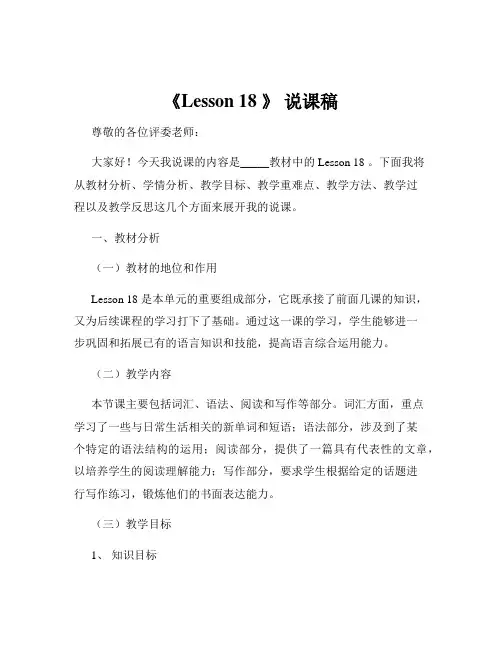
《Lesson 18 》说课稿尊敬的各位评委老师:大家好!今天我说课的内容是_____教材中的 Lesson 18 。
下面我将从教材分析、学情分析、教学目标、教学重难点、教学方法、教学过程以及教学反思这几个方面来展开我的说课。
一、教材分析(一)教材的地位和作用Lesson 18 是本单元的重要组成部分,它既承接了前面几课的知识,又为后续课程的学习打下了基础。
通过这一课的学习,学生能够进一步巩固和拓展已有的语言知识和技能,提高语言综合运用能力。
(二)教学内容本节课主要包括词汇、语法、阅读和写作等部分。
词汇方面,重点学习了一些与日常生活相关的新单词和短语;语法部分,涉及到了某个特定的语法结构的运用;阅读部分,提供了一篇具有代表性的文章,以培养学生的阅读理解能力;写作部分,要求学生根据给定的话题进行写作练习,锻炼他们的书面表达能力。
(三)教学目标1、知识目标学生能够掌握本节课的重点词汇和短语,如_____、_____等。
学生能够理解并正确运用本节课的语法结构,如_____。
2、技能目标通过阅读训练,提高学生的阅读理解能力,能够准确获取文章中的关键信息。
通过写作练习,培养学生的书面表达能力,能够用所学语言知识清晰、准确地表达自己的观点和想法。
3、情感目标激发学生学习英语的兴趣,增强学习自信心。
培养学生的合作意识和团队精神。
(四)教学重难点1、教学重点重点词汇和短语的记忆与运用。
语法结构的理解和正确使用。
2、教学难点如何引导学生在实际情境中灵活运用所学的语言知识。
帮助学生克服写作过程中可能遇到的困难,如语法错误、词汇缺乏等。
二、学情分析(一)学生的知识基础经过之前的学习,学生已经掌握了一定的英语基础知识,如基本的词汇、语法和简单的听说读写技能。
但对于本节课的新内容,可能还需要进一步的学习和巩固。
(二)学生的学习能力学生的学习能力存在个体差异,部分学生学习积极性高,善于思考和总结;而部分学生可能需要更多的引导和督促。
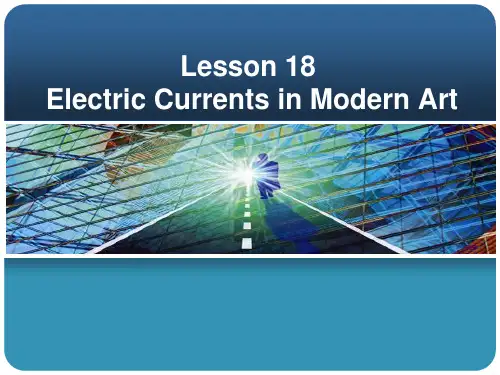
新概念英语第二册Lesson 18He often does this!他经常干这种事!After I had had lunch at a village pub, I looked for my bag. I had left it on a chair beside the door and now it wasnt there! As I was looking for it, the landlord came in. "Did you have a good meal?" he asked. "Yes, thank you, "I answered," but I cant pay the bill. I haven‘t got my bag." The landlord smiled and immediately went out. In a few minutes he returned with my bag and gave it back to me."I’m very sorry," he said. “ My dog had taken it into the garden. He often does this!”【课文翻译】After I had had lunch at a village pub, I looked for my bag.我在一家乡村小酒店吃过午饭后,就找我的提包。
I had left it on a chair beside the door and now it wasnt there!我曾把它放在门边的椅子上,可这会儿不见了!As I was looking for it, the landlord came in.当我正在寻找时,酒店老板走了进来。
Did you have a good meal?" he asked.“您吃得好吗?”他问。
Lesson 18 Turn right,Turn left教学目标:一、认知目标1、能听说读本课课文内容。
2、掌握新单词:office,stairs3、掌握新句型:Where are you going?To the….Turn right.Turn left.Go staight.Go upthe stairs.Go down the stairs.二、能力目标1、能正确使用句型:Where are you going?To the….和他人交流要去某处,并且在为他人指路时能正确使用句型:Turn right.Turn left. Go staight.Go up the stairs.Go down the stairs.2、培养学生听说读和交际能力。
三、情感目标1、使学生体验学习、参与、合作和交际的乐趣。
2、通过本课的学习,进一步培养学生在生活中积极帮助他人的品德,并培养学生热爱生活,积极向上的思想。
重点新单词和新句型的教学与应用难点1、掌握单词straight的发音。
2、如何让学生在课堂上学会句型Where are you going?To the…. Turn right.Turnleft.Go staight.Go up the stairs.Go down the stairs.并能在现实生活中灵活运用。
教学准备多媒体课件教学设计Step1:Warming up:1.Greetings:What day is it? It’s….2.Play a game.Listen and do.Stand up.Sit down.Hands up.Hands down.Touch your eyes/nose/ears.Look up/down. Reach up/down.Point up/down.Step2:New Teaching:1.Present the words”left”and”right”Let the students read the words”left”and”right”on the screen for several times.T:Look!This is my left hand.This is my right hand.Listen and do.Show your left hand.Show your right hand.Touch your left eye.Touch your right eye.Stamp your left foot.Stamp your right foot.2.Show pictures and teach the phrases: Turn right.Turn left.Go staight.Let the students do as they say.3.One student says ,the other does.4.Do as the teacher says. Turn right.Turn left.Go staight.e the pictures to teach”stairs”” Go up the stairs.Go down the stairs.”6.Listen and repeat.7.Show pictures “classroom,gym,library,playground,office”to review old words andlearn the new word “office”.T:Wate is it? Ss:It’s a classroom/gym/library/playground. It’s an office.8.Show a mapT:How can she get to the classroom? Ss:Go straight…9.GameI hide an apple somewhere and let one student find it .Other students give her or him some help.They can use the sentences they have learned. “Turn right.Turn left.Go staight.:Step3:Practice1.Show picturesT:Where is he/she going? Ss:To the classroom/gym/library/office.2.Practice the dialogue in pairs.:Where is he/she going? To the classroom/gym/library/office.3.Explain:Where are you going? And listen,then answer the question:Where is shegoing?4.Show a pictureT:LiMing and LiuY ang meet each other.Here’s the dialogue between them.Please fill in the blanks.5.Try to remember the dialogue and act it out.6.Show another picture and let the students make a dialogue using the sentencesthey have learned.1)Prepare the dialogue in pairs.2)Presentation.Step4:ExerciseStep5:SummaryListen to a song “The Tabbit Dance”。
高中新概念英语第三册-Lesson 18(课文)TextLesson 18 Electric currents in modern art 现代艺术中的电流Modern sculpture rarely surprises us any more. The idea that modern art can only be seen in museums is mistaken. Even people who take no interest in art cannot have failed tonotice examples of modern sculpture on display in public places. Strange forms stand in gardens, and outside buildings and shops. We have got quite used to them. Some so-called'modern' pieces have been on display for nearly fifty years.In spite of this, some people--including myself--were surprised by a recent exhibition of modern sculpture. Thefirst thing I saw when I entered the art gallery was a notice which said: 'Do not touch the exhibits. Some of them are dangerous!' The objects on display were pieces of moving sculpture. Oddly shaped forms that are suspended from the ceiling and move in response to a gust of wind are quite familiar to everybody. These objects, however, were different. Lined up against the wall, there were long thin wiresattached to metal spheres. The spheres had been magnetizedand attracted or repelled each other all the time. In the centre of the hall, there were a number of tall structures which contained coloured lights. These lights flickered continuously like traffic lights which have gone mad. Sparks were emitted from small black boxes and red lamps flashed on and off angrily. It was rather like an exhibition ofprehistoric electronic equipment. These Peculiar forms notonly seemed designed to shock people emotionally, but to give them electric shocks as well!Language points(Attention: The following points are not covered by the video. It is better for you to watch the video or listen to the MP3 first and try to take notes on your own. Then you may check here to get more details. )1, Modern sculpture rarely surprises us any more. The idea that modern art can only be seen in museums is mistaken.rarely: not oftene.g. Modern sculpture does not surprise us any more.近义词:seldom: almost never 可见rarely的水准比seldom 要稍稍频繁一点句型转化:Sth. surprises sb. = sb. 系动词 surprised atby sth.that引导同位语从句,修饰限定the idea的内容。
Lesson 18Brand 牌子honestly 坦白的说heating 加热decorate 装饰part-timer 兼职工作者dentist 牙医similar 相似的trim修剪suede 小山羊皮大衣Dialogue1—Cigarette?—No, thanks. Not before lunch.—Please have one. It's a new brand.—I honestly don't feel like one at the moment, thanks.Dialogue2—I believe you take in foreign students.—Yes, if you don't mind sharing.—How much is it?—Nine pounds per week including heating.—Do you think I could have a look at it, please?—We're having it decorated at the moment. Will Friday do?Dialogue3—I wonder whether the dentist could fit me in early tomorrow.—I'm afraid there's nothing before midday.—How about 12:45?—Sorry, but that's taken, too.Dialogue4—I was wondering whether you needed any part-timers.—What were you thinking of?—A hotel job of some sort.—Have you ever done anything similar?—Not so far, no.—There's nothing at present, but look back in a week.Dialogue5—How do you want it, sir?—Just a trim, please.—Would you like it washed?—No, thank you. Just leave it as it is.Dialogue6—Are you being served?—No. What have you got in the way of brown suede jackets, size forty-two? —Sorry, but we're sold right out.—Are you likely to be getting any more in?—I should think so, yes. If you leave your phone number, I'll ring you.Dialogue7—Eastbourne 54655.—Hello. John here. Can I speak to Mary, please?—Hold the line, please.—OK.—Sorry, but she's out.—Would you tell her I rang?—I'd be glad to.Dialogue8—4864459.—Hello. David Black speaking. May I have a word with June?—I'll just see if she's in.—Right you are.—I'm afraid she's not here.—Could you take a message?—Yes, of course.Section two单词讲解:Brush up my English 提高我的英语be keen on 对什么热衷,感兴趣aboard 在国外information 信息employment 雇佣medium-size 中等大小cosy 温馨的create 创造intimate 亲密的atmosphere 气氛peak 高峰responsible 有责任的necessary 必要的otherwise 否则的话forecast 预测awake 醒着的twin 双胞胎robbery 抢劫mask 面具recognize 认出,识别的出fingerprint 指纹jewel 珠宝mattress 床垫burglary 入室盗窃fortune 幸运goal 目标,球门pitch 球场muddy 泥泞的sprain 扭伤muscle 肌肉footballer 球员scream 尖叫score得分A. Interview(Elina Malinen was in fact invited for an interview at the "Bon AppetitRestaurant". Here is part of the interview.)Johnson: Good evening, Miss Malinen. Won't you sit down?Elina: Good evening. Thank you.Johnson: Now, I notice you left the Hotel Scandinavia in l980. What are you now doing in England?Elina: I'm spending a few months brushing up my English and getting to know the country better.Johnson: And you want to work in England too. Why?Elina: I'm keen on getting some experience abroad, and I like England and English people.Johnson: Good. Now, I see from the information you sent me that you've worked in your last employment for nearly four years. Was that a largerestaurant?Elina: Medium-size for Finland, about forty tables.Johnson: I see. Well, you'd find it rather different here. Ours is much smaller, we have only ten tables.Elina: That must be very cosy.Johnson: We try to create a warm, intimate atmosphere. Now, as to the job, you would be expected to look after five tables normally, though we get in extra staff for peak periods.Elina: I see.Johnson: I'm the Restaurant Manager and Head Waiter, so you'd be working directly under me. You'd be responsible for bringing in the dishes from the kitchen, serving the drinks, and if necessary looking after the bills. So you'd be kept pretty busy.Elina: I'm used to that. In my last position we were busy most of the time, especially in summer.Johnson: Good. Now, is there anything you'd like to ask about the job? Elina: Well, the usual question—what sort of salary were you thinking of paying?Johnson: We pay our waiters forty pounds a week, and you would get your evening meal free.Elina: I see.Johnson: Now, you may have wondered why I asked you here so late in the day. The fact is, I would like to see you in action, so to speak. Would you be willing to act as a waitress here this evening for half-an-hour or so? Our first customer will be coming in, let me see, in about ten minutes' time.Elina: Well, I'm free this evening otherwise.Johnson: Good. And in return perhaps you will have dinner with us? Now, let me show you the kitchen first. This way, please ...B. DiscussionTom: Well, what's the forecast? Are we going to have more snow? And ... is your mother awake?Helen: Hang on, Dad. The first answer is 'yes' and the second is 'no'. Let's have a cup of tea.Tom: That's a good idea. ... Where's Jean? Where's your mother? Jean, how about some breakfast?Helen: Shh. Mother's still asleep, as I've told you.Tom: And what about the twins? Where are Peter and Paul?Helen: They were sick all night. That's why Mum is so tired today. And ... they're having a birthday party tomorrow. Remember?Tom: Another birthday? Helen, look at the clock. It's 8:45. Let's go. We're going to be late.C. Past mistakes—Me, officer? You're joking!—Come off it, Mulligan. For a start, you spent three days watching thehouse. You shouldn't have done that, you know. The neighbors gotsuspicious and phoned the police ...—But I was only looking, officer.—... and on the day of the robbery, you really shouldn't have used your own car. We got your number. And if you'd worn a mask, you wouldn't havebeen recognized.—I didn't go inside!—Ah, there's another thing. You should've worn gloves, Mulligan. If you had, you wouldn't have left your fingerprints all over the house. We found your fingerprints on the jewels, too.—You mean ... you've found the jewels?—Oh yes. Where you ... er ... 'hid' them. Under your mattress.—My God! You know everything! I'll tell you something, officer—youshouldn't have joined the police force. If you'd taken up burglary, you'dhave made a fortune!D. MonologueWhy do people play football? It's a stupid game, and dangerous too.Twenty-two men fight for two hours to kick a ball into a net. They get more black eyes than goals. On dry, hard pitches they break their bones. Onmuddy ones they sprain their muscles. Footballers must be mad. And why do people watch football? They must be mad too. They certainly shout and scream like madmen. In fact I'm afraid to go out when there's a footballmatch. The crowds are so dangerous. I'd rather stay at home and watch TV.But what happens when I switch on? They're showing a football match. So I turn on the radio. What do I hear? 'The latest football scores.' And what do I see when I open a newspaper? Photos of footballers, interviews withfootballers, reports of football matches. Footballers are the heroes of the twentieth century. They're rich and famous. Why? Because they can kick a ball around. How stupid! Everyone seems to be mad about football, but I'm not. Down with football, I say.Section ThreeDictationMrs. Brink: Come in. Oh, it's you again, Tom. What have you done this time? Tom: I've cut my finger and it's bleeding a lot.Mrs. Brink: Let me see, Tom ... Hmmm, that is a bad cut. I can clean it and put a plaster on it, but you'll have to see the doctor。